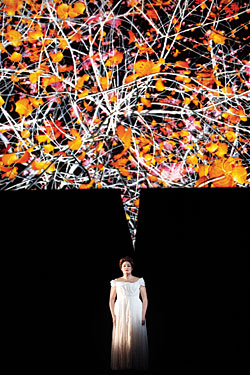
Running an opera company is about as staid a way to make a living as bull-riding in a rodeo. The stakes can be existential, the opportunities for humiliation boundless, the glory confined to a subculture of aficionados, and the variables inscrutable. In the Metropolitan Opera’s first crack at Rossini’s Le Comte Ory, the company has minimized both the danger and the payoff by applying a formula full of hedges: major composer, minor work, major singers, minor production. Meanwhile, across the plaza, New York City Opera takes a different tack, spreading the risk among three spring events: Monodramas, a program of three one-acts for solo soprano that seems geared to connoisseurs of angst; Jonathan Miller’s seductive and sprightly production of Donizetti’s L’Elisir d’Amore (The Elixir of Love); and, still to come, Séance on a Wet Afternoon, the operatic debut of Broadway veteran Stephen Schwartz. Whatever the merits of each component, such a season makes the company impossible to ignore. Even the failures have a certain irresistible élan.
Monodramas opens thrillingly with La Machine de l’Être, a ten-minute burst of hyperactive vocalizing composed by John Zorn and sung with pyrotechnic grace by the soprano Anu Konsi. The music doesn’t need a text or a story, and it could even dispense with Michael Counts’s perplexing visuals, but it does depend on the depth of an opera company’s resources. Only a large institution can supply an orchestra capable of handling the piece’s crystalline complexity, led by a conductor as assured as George Manahan. And perhaps only City Opera would put such a compact piece on such a generous stage. The packed and crackling score distills Zorn’s explosive saxophone playing, his tightly cornered jazz compositions, and the raucous wit of his string quartets into a wordless but brilliantly vocal showpiece that Konsi flicked and twirled. If the evening had ended there, after the first third of the triptych, I would have gone home happy.
It didn’t, and I didn’t. Arnold Schoenberg’s Erwartung, written in 1909, seems on the surface to belong to a different world from Morton Feldman’s Neither, from 1977. The first bristles with Expressionistic complexities, rhythmic jitters, and elusive rapture. The second draws out an inchoate thought into an obsessive hour of cloudy atmospherics. Schoenberg avoids repeating anything, and leads the voice all over its range; Feldman savors reiteration, dropping the soprano on an alarm-high pitch and leaving her there for minutes at a time. Erwartung delivers a prolix dramatic monologue that might be a dream as recounted in a therapist’s office; in Neither, Samuel Beckett’s terse few lines get distended into abstract phonemes. These contrasts—and the loving, expert performances by Kara Shay Thomson in the Schoenberg, Cyndia Sieden in the Feldman, and the orchestra in both—should have lent the show enough variety, but in the end, three acts of avant-garde soprano singing add up to a tiresomely squeaky night. Why aren’t there any operas for solo basso?
Counts has threaded these three disparate works together with a sequence of suggestively connected images: an ensemble of figures in chadors, a shower of crimson petals, a flock of silvered boxes suspended from the ceiling and reflecting shards of light like giant cubical sequins. But each idea outlasts its charm. Plastic-looking figures in tight-fitting formalwear prowl the stage as if they hadn’t been told when to exit. One burqa is unhooked, revealing a Western costume beneath. Then another robe falls away, and another, and another. The shiny boxes descend, rise, reverse course again, twirling and twirling like a robot-ballet version of Waiting for Godot.
To hedge its lineup against this reckless orgy of modernism, the company is relying on Donizetti’s indestructible romp about a rube, a girl, and a love potion. The Elixir of Love needs a rural setting, but any land will do, and for his 2006 production Miller chose some dusty desert truck stop in the American Southwest, circa 1960. The conceit fits nicely, and provides the female characters an opportunity for plenty of Marilyn-ish flouncing to go with their coloratura. But the real reason to catch this revival is David Lomelí, a young Mexican tenor making the first of what I hope will be many New York appearances. Lomelí’s voice is not huge, and he sometimes allows his intonation to skid as he strains to fill the house. But experience should take care of that, and in the meanwhile he has a lovely halo of peach fuzz around his tone, a tender, natural way with a phrase, and a seductive high pianissimo.
In the bel canto–tenor game, the Met sees City Opera a David Lomelí and raises it a Juan Diego Flórez. Flórez is at his hammiest and most winning in Bartlett Sher’s new production of Le Comte Ory, an antic comedy that involves soused noblemen dressed up in pious women’s wimples. The Met is diminishing its risk here, flanking Flórez with a pair of world-class scene-stealers, Joyce DiDonato and Diana Damrau, and literally throwing them all into bed together. But the sum of these talents only fitfully rises above well-oiled silliness. If depths of feeling lurk within the score, neither Sher nor the conductor, Maurizio Benini, has had much luck locating them. Sher deftly maneuvers a cast dressed in Catherine Zuber’s exuberant costumes, but the summer-stock-stage-within-a-stage set, with its hand-cranked chandeliers that bob up and down in inadvertent imitation of Counts’s silver cubes, feels contrived. More debilitating, Benini turns in a performance that comes out hazy and subdued, adjectives that don’t belong anywhere near the name Rossini. With City Opera right next door, plunging into projects it believes in, the Met can’t afford to stint on passion. Sometimes prudence is unwise.
Le Comte Ory
Gioachino Rossini.
Metropolitan Opera. Through April 21.
Monodramas
John Zorn, Morton Feldman, and Arnold Schoenberg.
New York City Opera.
Through April 8.
The Elixir of Love
Gaetano Donizetti.
New York City Opera.
Through April 9.
